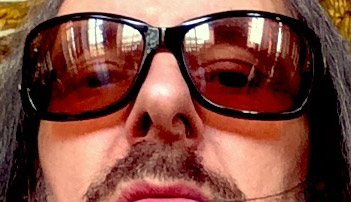"Keep the Drummer Happy"
 Nick Launay on Recording Lou Reed, Kate Bush, Midnight Oil
Nick Launay on Recording Lou Reed, Kate Bush, Midnight Oil
Throughout the years, Nick Launay has worked with Nick Cave & the Bad Seeds, PiL, Gang of Four, Lou Reed, Kate Bush, Midnight Oil, Yeah Yeah Yeahs, Arcade Fire, INXS, Talking Heads/David Byrne, and The Band of Skulls. Here he discusses why raw sounding records take as much work as polished ones, why live albums require a different mixing approach — and why he prefers small drum rooms to big ones. And beyond all of that: the idea of capturing an enthusiastic performance.
 You've worked with artists that produce themselves, like Kate Bush. Often an artist is too attached to the music to carry out the dual role. What does it take to make it work?
You've worked with artists that produce themselves, like Kate Bush. Often an artist is too attached to the music to carry out the dual role. What does it take to make it work?
I think if the artist is established enough and have their finances in place, they can simply choose to produce their own album. The only other decision-maker would be the record company, depending on their participation. Whether they can actually succeed in doing so successfully depends on their understanding of the technologies, as well as the confidence to arrange their own songs. However, most talented artists know that they will benefit hugely from an outside opinion and perspective to bounce ideas off of, so they will usually choose someone who aesthetically has similar taste, or someone who has made albums they admire. Sometimes — as in the case of Kate Bush and her album The Dreaming — they will choose to have a good engineer who can get the sounds they'd like to hear on their album. Often, in my early days of record making, I would be hired solely as an engineer. But I ended up playing a larger role, regarding making decisions about arrangements and so on. So when the album was finished the artist kindly credited me as co-producer — Public Image Ltd. and Killing Joke, for example.
I remember a quote from you where, on a superficial technical level, one might say the bands like those two are not very good, but you'd found out they were great musicians.
I think there are two types of musicians: The first are the ones who go to school and learn how to technically play their chosen instrument. The second are the type that just feels music, and does the best they can with their instrument to express what they feel; learning along the way, and driven mostly by the mood they want to achieve. I prefer the second type. I find that musicians who have been taught the "proper way" tend not to experiment as much, because in the teaching they were given rules. Most great musicians that inspire us often don't know exactly what the chords they are playing are called. Much to my surprise and delight, I found even someone as famous for their skills as Eric Clapton didn't know what chords he was playing when asked by other musicians in the room. I think it's true to say that some people, like Johnny Marr and Warren Ellis, are born into this world with fantastic gifts and dexterity; and, with practice, their passion of music becomes extraordinary.
What constitutes a good producer?
To me, a good producer — of artists and bands who write their own material — is someone who, after listening intently to their demos, can then take the songs and transform them into the best and most engaging versions imaginable. At the same time, they can get the best performance the artist can perform at that point in their life, without losing any magic that may exist in the raw demos. A bad producer would be someone who fails to grasp the essence of what is good about a song. Or, if working with a band, ignores what's unique and special about the chemistry of that group of people, and imposes his or her ego onto their recording.
When you worked on Midnight Oil's Earth and Sun and Moon, the band changed to an "indie" type of sound, away from the polished '80s rock style of their hit records.
I think having made a few adventurous sounding albums with them in the early '80s —10,9,8,7,6,5,4,3,2,1 and Red Sails in the Sunset — and the band then making two very polished sounding albums after that — there was a strong feeling from us all to want to make something that sounded very raw, honest, and warm. It was more a decision based on sound, and involved just as much effort and production tricks to make it sound "raw" as a polished "produced" album. The equipment used, and way of getting there, is just different. For example, we did not use click tracks. We had the whole band play at...